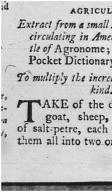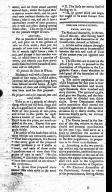[ To multiply the increase of Corn of any kind / To prevent the smut in wheat / To prepare seed to be sown on poor and sandy lands ] Pons Augustin Alletz
Date: 1791/09/23
Source:
Royal Gazette and Miscellany of the Island of Saint John
Institution: University Of New Brunswick
| Source Origin: Harriet Irving Library Microfilms (HIL-MIC)
A series of agricultural instructions said to be from Agronome; or, The Farmer's Pocket Dictionary. L'Agronome Dictionnaire Portatif Du Cultivateur by Pons Augustin Alletz was printed in Paris in 1760 in 2 volumes.
Extract from a small French Work, now
circulating in America, under the Ti-
tle of Agronome; or, The Farmer's
Pocket Dictionary.
To multiply the increase of Corn of any
kind.
TAKE of the dung of the cow,
goat, sheep, and pigeon, and
of salt-petre, each one pound; put
them all into two or three gallons of
water, and let them stand covered
several days; strain the liquid thro'
a sieve or coarse cloth, and let your
seed corn moisten therein for eight
hours; take it out, and put it into a
convenient corner of your granary;
stir it well and often during several
hours after. This recipe is adapted
to 160 pounds weight of corn.
ANOTHER.
Put 20 pounds of lime into a bar-
rel, and pour on it ten gallons of
rain or river water; then put 120
pounds of corn into a basket, and
let it remain eight hours; take it
out, and plunge it into another ves-
sel, in which there is a quantity of
water, and wherein you have previ-
ously dissolved three pounds of com-
mon salt or salt-petre.
To prevent the Smut in Wheat.
Moisten it well with a liquor com-
posed of lime water, in which ashes,
common salt, and pigeon dung have
been infused several hours. A light
solution of alum and verdigrise has
also been used for this purpose.
To prepare seed to be sown on poor and
sandy lands.
Take 12 or 13 pounds of sheep's
dung, which you will boil, dregs and
all, in a good deal of water, Dissolve
three or four pounds of salt-petre,
and infuse in this pickle for eight
hours a bushel of new wheat, &c.
Dry it in an airy place, not much ex-
posed to the sun. Repeat this ope-
ration several times, and sow your
grain thinly.
The author of the book from which
these receipts are extracted, asserts,
"That from experience, it is known
"that every grain of the prepared
"seed produces 7 or 8 stalks at
"least, and each of those stalks
"produces ears of more than fifty
grains of corn in each." He also
informs, "that more than 60 stalks
"have been counted on one shoot."
He continues--
"I. Grain thus prepared starts
sooner than when sown in the usual methods.
_____
"II. The birds are not so fond of
feeding on it.
"III. It grows thick and large,
but ought to be sown thinner than
usual."
Download: Transcription | Images

